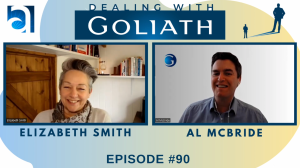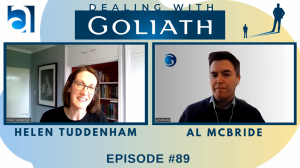Show Notes:
- The number one mistake beginner coaches consistently make
- Don’t make assumptions: diagnosis before prognosis
- Difference between coaching and consulting
- Two simple things to make a coaching session a success
- The problem with pushing too hard or feigning interest
- Be authentic and fully present
Transcript
Al McBride 0:04
Welcome to the dealing with Goliath podcast. This is a solo espresso episode that I call giving value by trying not to give value.
Al McBride 0:16
Right. So I was thinking about this the other day, this was one of the most common issues when I was coaching coaches on how to coach. I was guest lecturing in a master’s and coaching program in Ireland, which was great fun, actually some great people, and some of that involved in some mentoring and whatnot. But this was easily the most common issue that beginner coaches have, which is they want to try and give value all the time I want you to be, you know, it’s almost like chasing them around the room.
Al McBride 0:58
Metaphorically speaking, there’s like, here’s an idea, here’s an idea I’m trying to give value. They want to jump in and they want to solve the problem. Without realizing that’s not really the coach’s job, the Coach is to help the client solve the problem. All right, but they were thinking that might help us there are responsibilities. So can people get very stressed, very worked up.
Al McBride 1:23
But they were trying to solve the problem, before they even fully understood the problem is a very dangerous assumption to jump into early assumptions are very dangerous things. As a mentor of mine, oh, it says, diagnosis before prognosis, which is a great, great little phrase for you. First of all, you have to understand the world, you have to understand the whole lots more of the context, you have to open that up with, with questions move that focus around with questions.
Al McBride 1:54
But I suppose it’s also a thing around insecurity, they want to show what they know they wanted to impress, which is natural, because they’re, they’re starting out, they’re a bit nervous, that kind of thing. They want to make sure the client feels that they’re getting value, that they’re receiving something that’s worthwhile. But what they didn’t really understand was that the first thing in coaching is to help the other person just simply feel understood feel that you’re fully present.
Al McBride 2:26
And that you’re listening to the words that you’re not distracted, that you’re actually hearing them. And some people it’s quite amazing, just being heard, can have a profound effect, that when people’s questions, so when the coach has questions come up, they’re exactly relevant to exactly what they’ve just said. Continually ongoing throughout the duration of the session.
Al McBride 2:54
Even that can have a huge impact, as I always used to say them, all you have to do is essentially Listen, and trust yourself. And if they are more resourceful within themselves, at the end of session than when they met you at the start, then it could be seen as a success, that was a big help to a lot of people.
Al McBride 3:15
But this same idea of essentially, the difference between chasing them around the room trying to here’s value, here’s value, you know, here’s ideas, here’s ideas, actually has that counteract have exactly the opposite effect than what you intended. I suppose in some ways, it’s also Well, before that, even it’s, it’s needing to let the client come to you so that you’re there and they essentially lean in.
Al McBride 3:45
when they choose to when they’re ready, they’re essentially stepping into that coach zone rather than you chasing them. So it’s a very different dynamic. And in some ways, that dynamic is also echoed, in coaching versus consulting. Where with consulting, you collect a lot of information, you get to findings, you put it through models and other whatnots and add the value and then you essentially give a report, this isn’t one model, you know one way of doing things where it says you if you want this outcome, we would advise in our expertise to do this these steps take these actions.
Al McBride 4:27
So it’s very much that expert to non experts, whereas the coaching Of course should be you know, adult, an adult we both have resources we’re bringing to this right. But it’s also then an interesting echo when it comes to coach I mean coaching is this is all about teaching one to fish.
Al McBride 4:48
It’s not about talking down it’s it’s about helping people get out as I say that resources within them. But I wonder is it similar with negotiations and sales situations also Because if you if you’re too strong when you’re trying to sell that can usually come across way off putting, you know, it’s like whoa, too much too much, you know, too hard to sell it’s uncomfortable people, you get the exact opposite reaction to the one that you’re hoping for.
Al McBride 5:18
But also feigning in negotiation situation, feigning lack of interest. Oh, I don’t really care on taking a leave it can often backfire very badly. Send the other side go, Oh, we went with this other crap, because you didn’t seem to be that interested? Oh, you were just like, I remember when I was an art dealer, sometimes people would come in and you could see they really liked the sort of painting.
Al McBride 5:44
They’re asking for this mad reduction. And then they go away, and they come back a week later, and the thing would be sold to someone else. And they’d say, Oh, where’s the painting? Oh, I really liked the painting. So right, we could have held it for you. For 48 hours, no problem, you know, this kind of thing.
Al McBride 6:02
But you didn’t seem to be that bothered? Oh, I was I was. So they were they were trying one of these strategies that might work in certain situations. But generally can backfire if you don’t use them very wisely.
Al McBride 6:17
So it’s one of these things as I said, where being in space, trying to be genuine and authentic with what you’re about fully present. Not trying over too hard. To give value can actually sometimes be the best way to give more genuine value to your clients, or indeed to people you’re entering business relationships with
Transcribed by https://otter.ai
Resources
If you’re interested in more visit www.almcbride.com/minicourse for a free email minicourse on how to gain the psychological edge in your negotiations and critical conversations along with a helpful negotiation prep cheat sheet.




